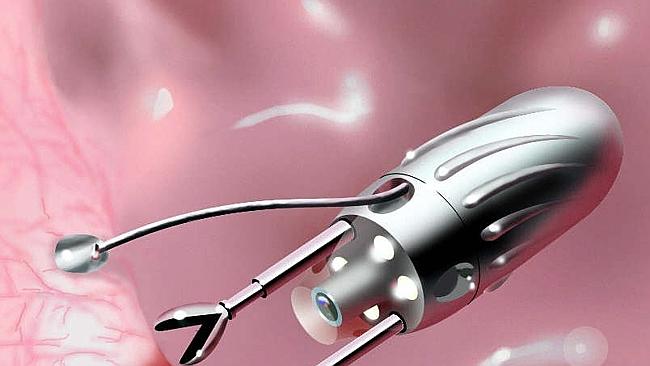
Illustration of a Japanese nanobot / microcapsule that Olympus is developing to “swim” around the body repairing things as they go. Source: News Corp Australia
WHEN it comes to innovative technology on a truly epic scale there’s nothing more exciting (or scary) than nanorobotics.
Scientists are developing robots smaller than the width of a human hair with the idea they could be controlled on a molecular level — that’s literally moving atoms and cells us humans aren’t able to.
They could be programmed and put to use inside human bodies to tinker around with the smallest of our cells, be part of a million-strong miniature work force for rapid construction or even be used as a potential weapon.
But these little robotic critters have been putting the bejesus up us ever since science mentioned the name.
The thought of swarms of millions of microscopic machines working as one to literally deconstruct us by the very molecules we’re made from was enough for the likes of Prince Charles and Elon Musk — the millionaire inventor, CEO and real life Iron Man who’s been at the front of innovation — to raise their fears.
So will they kill us all or save humanity? The technology is still very much in the lab stage but used in the right way nanotech possibilities are truly worthy of sci-fi movie fodder. Think 1980s movie Inner Space but without Dennis Quaid living inside you.

Elon Musk has expressed concerns over robotic AI. Source: Supplied
Medicine
The application of nanotechnology in the field of medicine is possibly the most exciting and life-changing prospect. It has doctors and potential patients fizzing with excitement. Research is on going to develop nanobots that could be injected into our bodies to intelligently destroy disease and perform surgeries on individual cells we otherwise couldn’t. The cure for cancer could lie with these bots with trials underway using nanoparticles that seek and destroy cancerous cells but without harming surrounding healthy tissue like chemotherapy does.
We may never get sick in the future thanks to nanobot maintained immune systems. It would see the mini machines constantly monitoring you from the inside, pre-empting illness and performing the necessary actions like delivering drugs to keep you tip top. For instance if a cold virus is detected bots could actively breakdown the very atoms of the virus’ molecule. No more sniffles.
Medics are hoping nanobots might be the answer to a quicker way to administer medicine into the body as they can be programmed to go straight to the target area. The US defence agency DARPA is developing its In Vivo Nanoplatform program to help diagnose and rapidly treat disease within soldiers, perhaps eliminating the need for medics on the frontline as the drug-carrying bots could be self-delivered.
Elsewhere in medicine we are turning to nanobots to help in brain surgery thanks to their ability to manoeuvre their micron size through the complex and delicate passageways.
Human 2.0
So, that’s disease and illness terminated but nanotech won’t stop there. Scientists and futurists alike have pondered how it could be used to give our bodies a physical upgrade.
Nanotech pioneer Robert Freitas has designed a bot called a Respirocyte that can carry 9 billion oxygen and carbon dioxide molecules — 200 times that of typical red blood cells — meaning that humans could run at full tilt for a good 15 minutes without running out of puff. The same level ability to hold oxygen means we could also go without having to take a breath for hours. Scuba, anyone?

Scuba, anyone? Source: Supplied
As well as this super stamina muscle tissue could be broken down by bots and re-worked to give us super strength, poor eyesight could be rectified and teeth kept clean to microscopic levels.
Nanobots could be programmed to seek out ageing cells, tissue and muscles that have lost any ability due to degeneration for repair, replace and tune up. It means we could essentially extend lifespan and keep razor-sharp well into old age.
Environment
If you’re still wary of nanorobotics just think what they could do for the environment. A disaster like an oil spill takes an extraordinary level of effort to clean, if fully cleaned at all. But many hands make light work so nanobots deployed at the scene could get scrubbing in their millions, destroying every contaminated molecule much faster than any method currently available. In smog ridden cities or chemical emitting factories a swarm released into the atmosphere could deconstruct the pollutants.

Nanobots are the future. Source: Supplied
Safe, purified drinking water without the need for chemicals could be made available anywhere with nanotechnology particles destroying the water-borne bacteria, which claims many lives.
Of course for all your practical and serious applications there are endless potential quirky uses for nanorobotics. From self-cleaning clothes, cars that can repair themselves, to keeping food fresh you can be sure there are people in white coats squinting down a microscope right now to bring us tomorrow’s world today.
Originally published as Nanobots will change everything
